The UN SDG Pavilion “Circular Economy: A Path to Climate Solutions and Sustainable Development” Brought to a Successful Conclusion at COP 28
The UN SDG Pavilion “Circular Economy: A Path to Climate Solutions and Sustainable Development” Brought to a Successful Conclusion at COP 28
December 6, 2023, Dubai, UAE — the United Nations SDG Pavilion side event “Circular Economy: A Path to Climate Solutions and Sustainable Development” concluded successfully at the COP28 on December 2. Jointly hosted by the Ellen MacArthur Foundation, ClimateWorks Foundation, and the National Center for Climate Change Strategy and International Cooperation of China (National Climate Strategy Center), this convening brought together thought leaders, policymakers, and youth practitioners from around the world.
Amidst the global challenges of climate change, biodiversity loss, and pollution, the circular economy – a system where materials never become waste and nature is regenerated – is emerging as a new development paradigm, showcasing immense potential. This event explored the international perspective on the role of the circular economy in effectively reducing carbon emissions and enhancing adaptation and resilience to climate change, thus unlocking the potential of the circular economy as a systemic solution to climate change and other sustainable development challenges.
The opening remarks were moderated by Xu Huaqing, Director General of the National Climate Strategy Center. Speeches were delivered by Liu Zhenmin, Senior Advisor to the Chinese COP Delegation; Li Junhua, UN Under-Secretary-General for Economic and Social Affairs; Jyoti Mathur-Filipp, Executive Secretary of the Secretariat of the Intergovernmental Negotiating Committee on Plastic Pollution; Luis Vayas Valdivieso, Ambassador of Ecuador to the United Kingdom, chair of the Intergovernmental Negotiating Committee on Plastics Pollution, and Zhang Xiaohua, China Country Director of ClimateWorks Foundation.
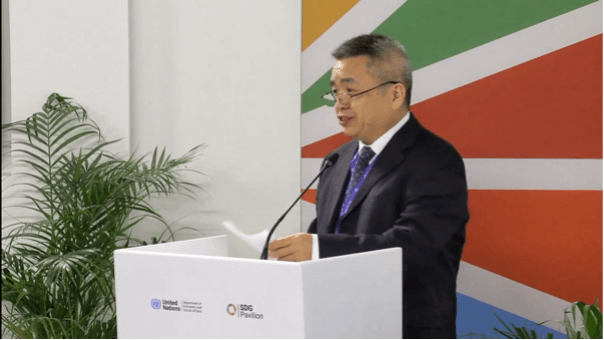
Liu Zhenmin, Senior Advisor to the Chinese COP Delegation, delivered a compelling speech, stating “The circular economy has been one of my favourite topics for years during my service at the UN. It is about improving social and economic efficiency, especially the efficiency of energy and other material resource utilisation through conceptual, technological, and management innovation. It presents universal solutions to some of the world’s most pressing cross-cutting sustainable development challenges.”
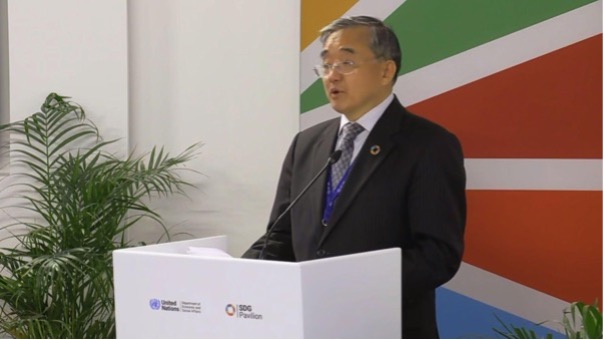
Li Junhua, UN Under-Secretary-General for Economic and Social Affairs, mentioned in his speech, “The circular economy provides a clear path to climate solutions and sustainable development. Within the 2030 agenda, particularly as SDG 12 on responsible consumption and production lies a transformative roadmap. We must transition to an economic system that places sustainability at its core.”
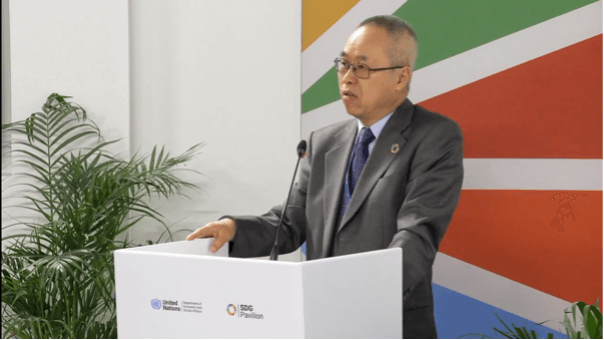
Jyoti Mathur-Filipp, Executive Secretary of the Secretariat of the Intergovernmental Negotiating Committee on Plastics Pollution, stated during the opening remarks: “Just last year, the UN Environment Assembly adopted resolution 5/14 to end plastic pollution. They requested the executive director of the UN Environment Program to start negotiations on a legally binding instrument for plastic pollution, including in the marine environment. This is really historic. If we shift to a circular economy, there will be a 25 percent reduction in greenhouse gas emissions, and we will reduce by over 80 percent the volume of plastics entering our oceans. We will save governments about $70 billion for reduced volume of plastic waste and create savings of more than $4.5 trillion.”
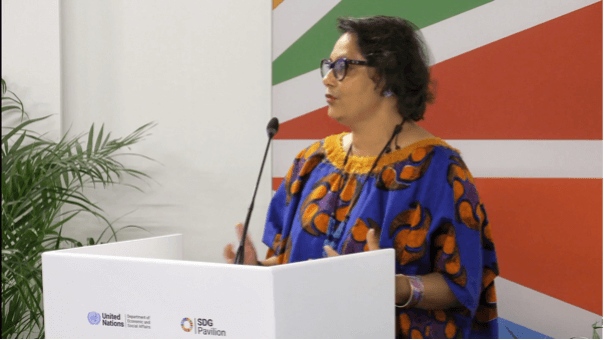
Luis Vayas Valdivieso, Ambassador of Ecuador to the United Kingdom, chair of the Intergovernmental Negotiating Committee on Plastic Pollution stated, “Circular economy is a quite important chapter in our negotiations among others. But at the same time, it’s quite important to work on top and negotiate the whole life cycle of plastics. It’s also very important to listen to scientists, academia, organisations, and to work with the private sector and other stakeholders in this process, they have a lot of contributions.”
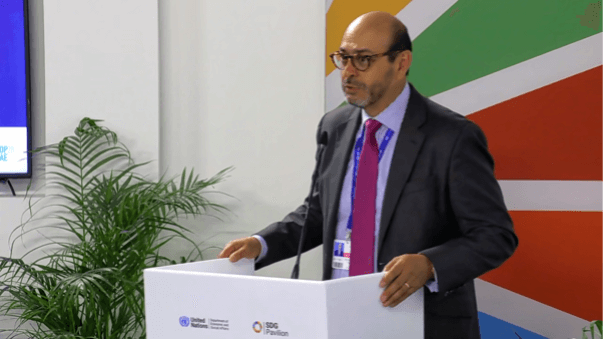
Zhang Xiaohua, China Country Director of ClimateWorks Foundation delivered the speech on behalf of Helen Mountford, the President and CEO of ClimateWorks Foundation, “ We must take bold climate action that rapidly transforms the system at the speed and scale needed to secure a thriving and equitable future. This is where the circular economy comes into play, standing at the forefront of addressing our era’s most pressing challenge — climate change. By 2030, the circular economy is essential for achieving global targets as it can support resource efficiency, supply chain resilience, innovation, and collaboration, and contribute to climate change mitigation.”
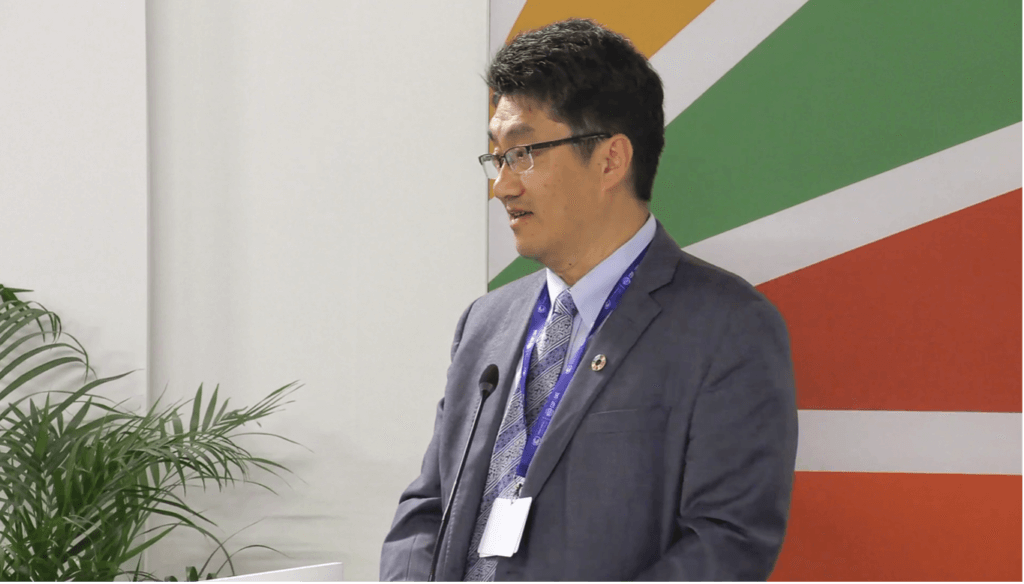
According to Ellen MacArthur Foundation, energy efficiency and switching to renewable energy can only address 55% of global GHG emissions. The remaining 45% of emissions requires new strategies such as shifting to a circular economy, to fundamentally reform current production and consumption patterns.[1]
Miranda Schnitger, Climate Lead at the Ellen MacArthur Foundation, delivered a keynote speech on “The Circular Economy’s Role in Climate Action and SDG Achievement.” She highlighted the potential impacts and implementation strategies of the circular economy in sectors such as plastics, textile, food, and renewable energy, emphasising their role in tackling climate change.
“The three principles of the circular economy are: eliminate waste and pollution, circulate the materials and products, and regenerate the nature, and they apply across all sectors. I’m delighted that this year with the IPCC AR6 and the Global Stocktake, both of those important reports talked about systems transformation being fundamental. The circular economy is a systematic transformation, and we really need to accelerate it if we’re going to get onto that 1.5-degree trajectory.”
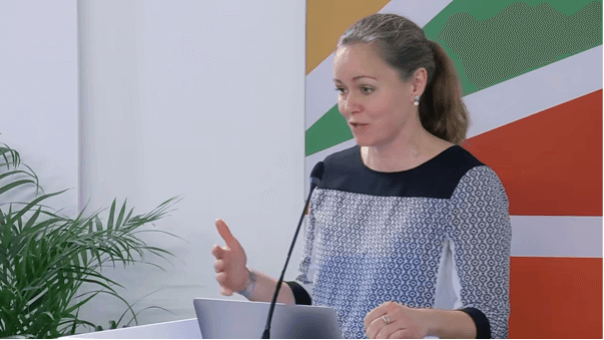
The roundtable discussion was moderated by Zhang Xiaohua, China Country Director of ClimateWorks Foundation. The distinguished guests included Wang Yi, Professor of Chinese Academy of Sciences, Vice President of National Expert Committee on Climate Change; Nathan Hultman, Director of the Center for Global Sustainability at the University of Maryland; Zhu Liyang, President of the China Association of Circular Economy; and Sherif Elrefaey, Youth Representative at Emam Foundation from Egypt. The discussion revolved around the theme “Unlocking Synergies: Circular Economy, Climate Action, and Sustainable Development Goals,” sparking enthusiastic and engaging conversations among the participants.
Nathan Hultman, Director of the Center for Global Sustainability at the University of Maryland mentioned, “China is doing to embed circular economy principles in the way that China is thinking about systemic transformation of their economy, and that will actually deliver a substantial amount of emissions reductions over time in that context. The Sunnylands Statement that the US and China recently agreed on highlighted the circular economy as an area that both countries will be collaborating on. I think from that bilateral conversation, the two countries have potentially catalytic effects on leadership, sort of working with the international community, as we’re working on within the COP context.”
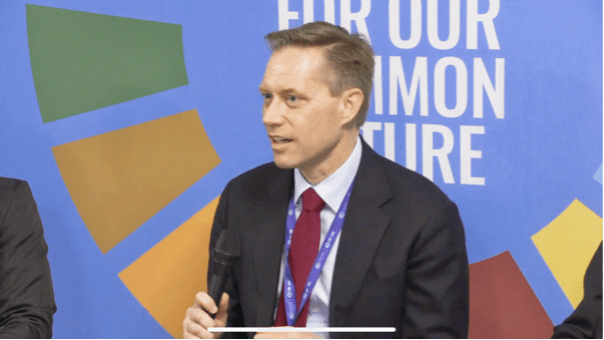
Wang Yi, Professor of Chinese Academy of Sciences, Vice President of National Expert Committee on Climate Change of China, stated that: “A circular economy not only contributes to the carbon emission reductions, but also increases the resource efficiency and promotes the industry transition from traditional to a green and low-carbon mode. But it brings both opportunities and challenges. We must improve our methodology towards carbon reduction effects of the circular economy, establish new standards, and revise our Circular Economy Promotion Law based on our new context. We should consider both the technology and policy aspects.”
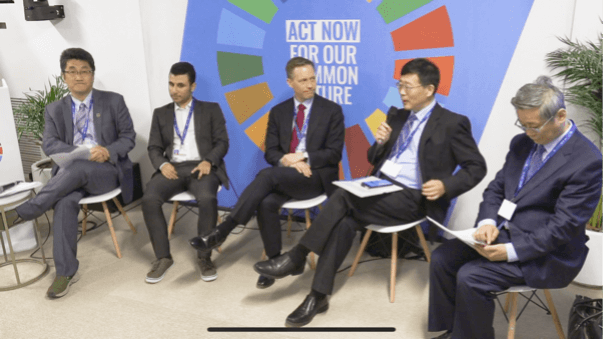
Zhu Liyang, President of China Association of Circular Economy shared China’s industrial prominence and its commitment to circular economy development, and China’s pivotal role in global sustainability efforts through impactful circular practices. He outlined three key strategies for promoting circular economy in the industrial system: accelerating circular economy transformation in industrial parks, focusing on circular economy industrial chains, and prioritising the recycling of industrial waste.
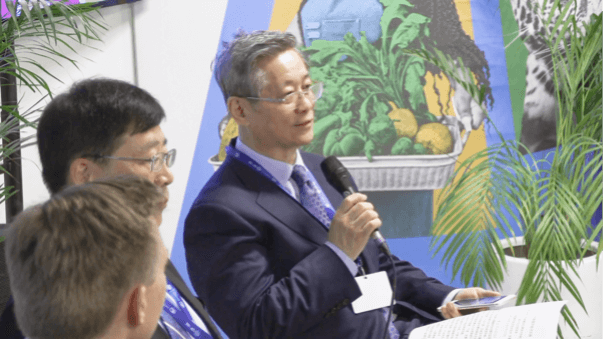
As a youth representative, Sherif Elrefaey from the Emam Foundation in Egypt also shared his experience working on climate. He mentioned that, in practice, some unfavourable conditions and circumstances prevent the actions of young people who have the ability to influence the development of the circular economy. Sherif has been involved in incubating and connecting resources for circular economy startups in Egypt. He has created opportunities for Egyptian youth to participate in COP through UN agencies. While the introduction of CBAM has had a profound impact on EU trading partners, there has been little discussion in Egypt. Currently, he is dedicated to initiating discussions on CBAM in Egypt, helping the country understand the impact of this mechanism on trade.
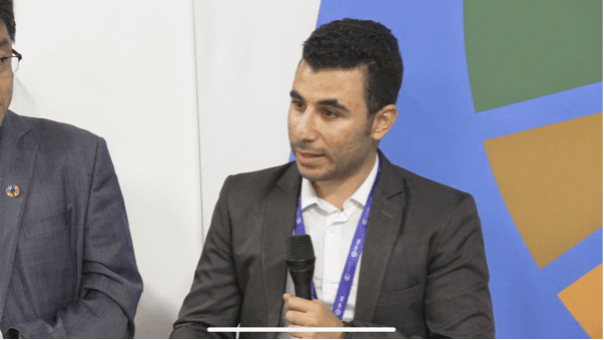
This side event brought together rich perspectives and profound insights from global policymakers, thought leaders, and practitioners in the fields of climate change and circular economy. It established an international platform for exchange and cooperation to promote the development of the circular economy as an effective strategy to address climate change. It also contributed to fostering collaborative efforts among countries in climate action, circular economy transformation, and sustainable development to collectively address the challenges posed by climate change.
Inspiring Moments
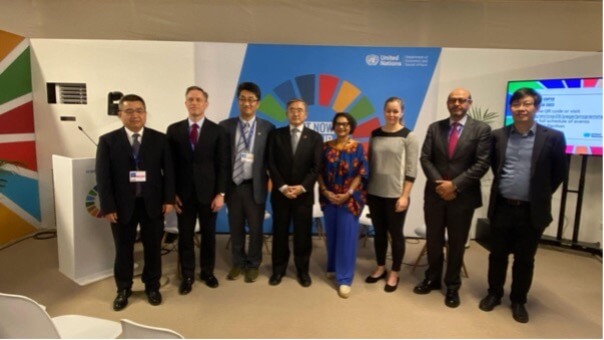
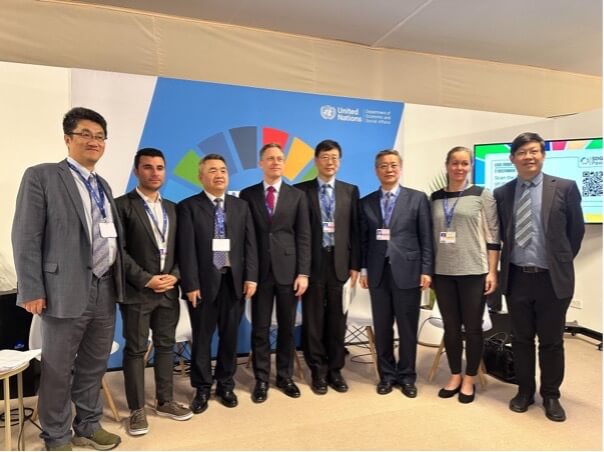
Media Contact
Yang Ziwei, (+86)18614033008, ziwei.yang@ellenmacarthurfoundation.org, Communications Manager
ABOUT THE ELLEN MACARTHUR FOUNDATION
The Ellen MacArthur Foundation is an international charity developing and promoting the circular economy in order to tackle some of the biggest challenges of our time, such as climate change, biodiversity loss, waste, and pollution. We work with our network of private and public sector decision-makers, as well as academia, to build capacity, explore collaborative opportunities, and design and develop circular economy initiatives and solutions. Increasingly based on renewable energy, a circular economy is driven by design to eliminate waste, circulate products and materials, and regenerate nature, to create resilience and prosperity for business, the environment, and people.
https://www.ellenmacarthurfoundation.org/
[1] Ellen MacArthur Foundation, 2019. Completing the picture: How the circular economy tackles climate change